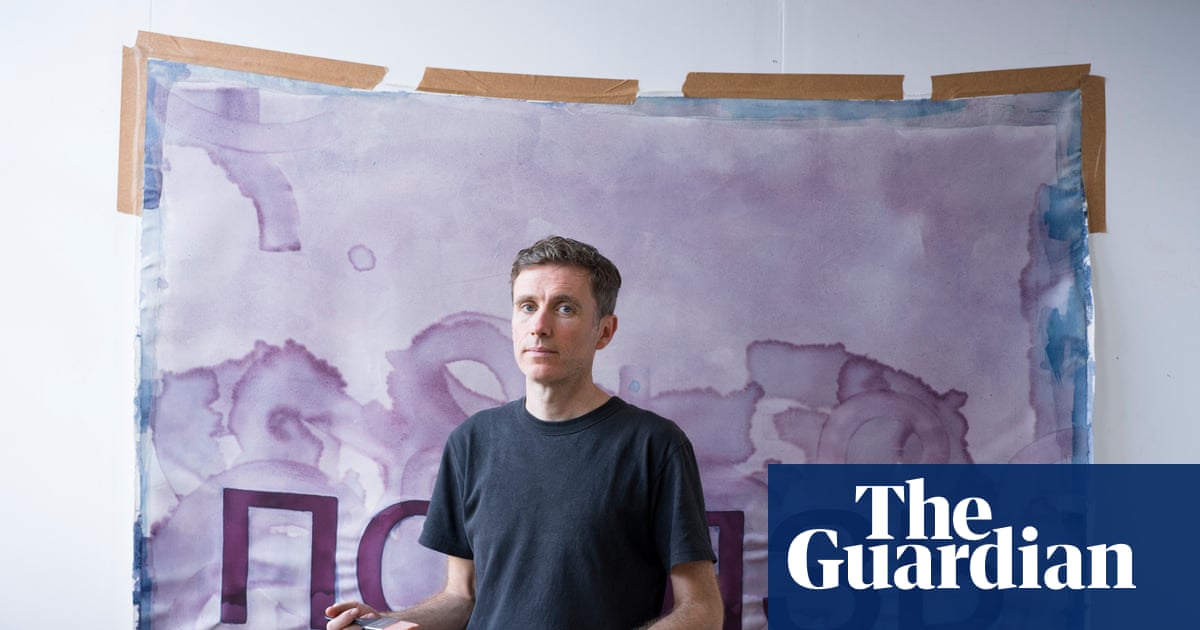In his studio, Sam Winston appears less artist, more linguistic alchemist. He is experimenting with manufacturing inks out of tobacco from Marlboro cigarettes, the juice of Belarusian chokeberries imported in a 100g packet small enough to make it past customs and a strange brew of kohl eyeliner from the Middle East and galena – the mineral form of lead sulfide – from Wales.
The coloured substances are used to conjure words on to giant canvas flags that will soon hang from the ceiling of London’s Barbican Centre – connecting a group of poets’ native languages with materials from their native landscapes. The quintet speak marginal or at-risk languages covering five continents, and their newly commissioned poems all speak to their sense of home.
The kohl concoction will spell out شلونچ؟ or “How are you?” in Arablish, a melding of Arabic and English, taken from a poem by Hanan Issa, the half-Iraqi National Poet of Wales. Quebec-born writer Norma Dunning’s flag will bear the word ᑕᖃ, or “veins” in Canadian syllabics, made out of wild blueberries foraged from her home terrain. The piece, Seed Syllable, will welcome visitors to Voiced, Britain’s first arts festival celebrating minority and endangered languages, or what the Barbican calls an “explosion of creative multilingualism”. In February, the extravaganza will travel on to Manchester, one of the world’s 53 Unesco Cities of Literature “dedicated to promoting cultural diversity and literary richness”.
Winston has been playing with language in his art for more than 20 years, including using cuneiform and Egyptian hieroglyphs in his celebrated picture book One and Everything – itself translated into 23 languages. His co-curator, poet Chris McCabe is editor of Poems from the Edge of Extinction and founder of the Endangered Poetry Project. Based at London’s Southbank Centre, it invites the public to submit poems in threatened languages, collating them for future generations.
Winston acknowledges the “sense of urgency and loss” – every two weeks, another language falls silent and by the end of this century, half of the world’s 7,000 tongues are expected to become extinct. But he was determined for this to be much more than a mournful symposium: “It is a festival and you want to have that playful and joyful element.”
After an opening event featuring Trainspotting author Irvine Welsh, there will be workshops including interactive sessions on the 94 languages spoken across the London borough of Hackney, and how to create your own alphabet. The live literature programme will showcase dialect poetry (from Scouse to Sylheti) and invented languages (from Klingon to Polari).
Throughout next month, there will also be the free-to-access Creative Voice Exhibition – an immersive area where you can contribute to a collaborative artwork by drawing, writing or rhyming your response to your favourite piece of language – and a family-friendly listening trail in which you can discover hidden languages using a map that will take you to quiet corners of the Barbican’s brutalist complex. “You’ll walk to different stations and you can hear all of these different communities,” says Winston. “It’s not really about language, it’s about how people get married and how people go fishing.”
Winston grew up in Devon, Wales and Yorkshire as a dyslexic boy “suspicious of all these tiny black marks … It felt like language was something that was quite authoritarian,” he says. It was only at Camberwell College of Art that he made a breakthrough, on a design course learning about typography and letter form.
“That experience of not being able to communicate what’s important to me, even in the English language, made me very sympathetic to a situation where Hawad” – one of the five poets, a Tamajaght-speaking artist from the Aïr region of Niger – “cannot share his language and his culture in a way that is supported by anyone beyond this small community. That made me an ally. It’s really important that we create spaces, and say these voices are valid.”
At the heart of the “audio treasure hunt” by sonic artist Jamie Perera is a piece titled Babel Reclaimed, in which a cacophony of hundreds of voices come together in perfect harmony. It was made in collaboration with linguist Mandana Seyfeddinipur, director of the Endangered Languages Archive (a Berlin-based digital repository for “unique records of local knowledge systems encoded in their languages”), and came from her rejection of the Tower of Babel parable, about humanity speaking in a unified tongue.
Some still regard the prospect of a single universal language – such as the 19th-century attempt to get the world to speak Esperanto – as a utopian ideal. Not Winston. “If we only have one paintbrush to paint in, and only one colour to paint with, that, from an artistic perspective, is a disaster.”
He has not yet properly engaged with the languages of his mother’s Irish and father’s East-End Jewish ancestors, but has explored Tibetan through his meditation practice and Hangul via his Korean partner.
“Language is an expression of being human, and that’s at the core of the festival,” he says. “You can turn up and learn about a lot of diverse cultures. But really what I would like is that you turn up and you learn a lot about yourself: ‘What is my past? Why don’t I know Ogham or Old Irish? What is my relationship to Yiddish?’ That would make me very happy.”
